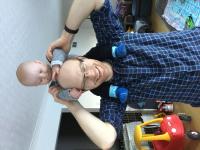Article,
Interpreting cognitive decline in the face of cognitive reserve: Does bilingualism affect cognitive aging?
Linguistic Approaches to Bilingualism, (September 2018)
Abstract
Evaluation of the cognitive level of older adults, including
decisions about meeting clinical thresholds for dementia, is
typically based on behavioral levels of performance. However,
individuals with high cognitive reserve will outperform the
levels typically associated with their brain structure,
providing inaccurate assessments of their status. We define
cognitive reserve as the relation between brain integrity and
cognitive level, and use the case of bilingualism as a source of
cognitive reserve to illustrate how information from only one
can distort the interpretation of the individual's cognitive
status.
